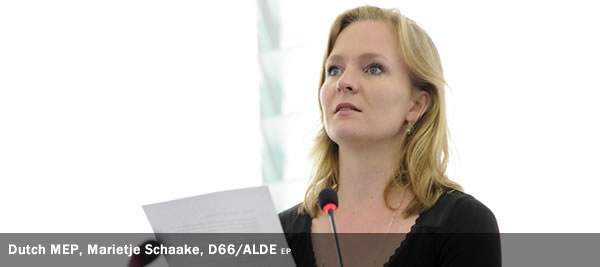Dutch Member of European Parliament Marietje Schaake (ALDE/D66) has called on EU foreign policy chief, Catherine Ashton, to provide clarification on the European Union’s developing offensive capabilities in cyber defence. “It looks like Ashton is aiming for European offensive capabilities to counter threats against critical European ICT infrastructure.”
“While cooperation in conventional defence is lagging behind, Ashton is now focusing on the digital sphere,” said Schaake, adding: “It is good to acknowledge the changing character of security and defence policies, but I want clarity and proper democratic oversight ensures.”
Yesterday, the European Parliament debated European security policy and adopted its own strategy document. “The Parliament is more cautious than Ashton; I want to know why she is pushing ahead and whether she has Member States support. Taking risks and creating an artificial sense of security won’t benefit anyone.”
Technological advances are changing both the tasks of armies and the way they operate, but it also forces them to cooperate more. “The use of drones or offensive cyber-attacks requires a solid democratic foundation. Essential questions about attribution, command and control structures and democratic oversight have not yet been answered”, said the MEP.
Schaake wants Ashton to provide a clear answer for the question if the EU is indeed developing offensive cyber capabilities. “If there is such a programme, then we need to look at how existing military doctrines, but also how the law of war and responsibility, apply in a cyber-war. As long as there are no clear agreements there, it is impossible to develop this capacity in a responsible way.” Schaake has asked for clarification before, but the new proposals lead to more questions.
Yesterday it was revealed that seven European countries are starting a joint programme to develop a drone, possibly with financial support from the European Commission. “Before we invest European money in this project, it needs to be clear what kind of device this would be and what it would be used for.” Recently the Dutch Organisation for Scientific Research presented the second National Cyber Security Research Agenda in which offensive capacity was named explicitly as a goal.
Schaake said: “In the broader discussion, we must not forget what it is we are trying to protect: people’s digital freedoms and an open society. Despite all the good intentions, we must be careful not to endanger those very freedoms by creating a lot of defence capacity, resulting in a digital arms race. To further advance European cooperation, democratic control is essential.”
